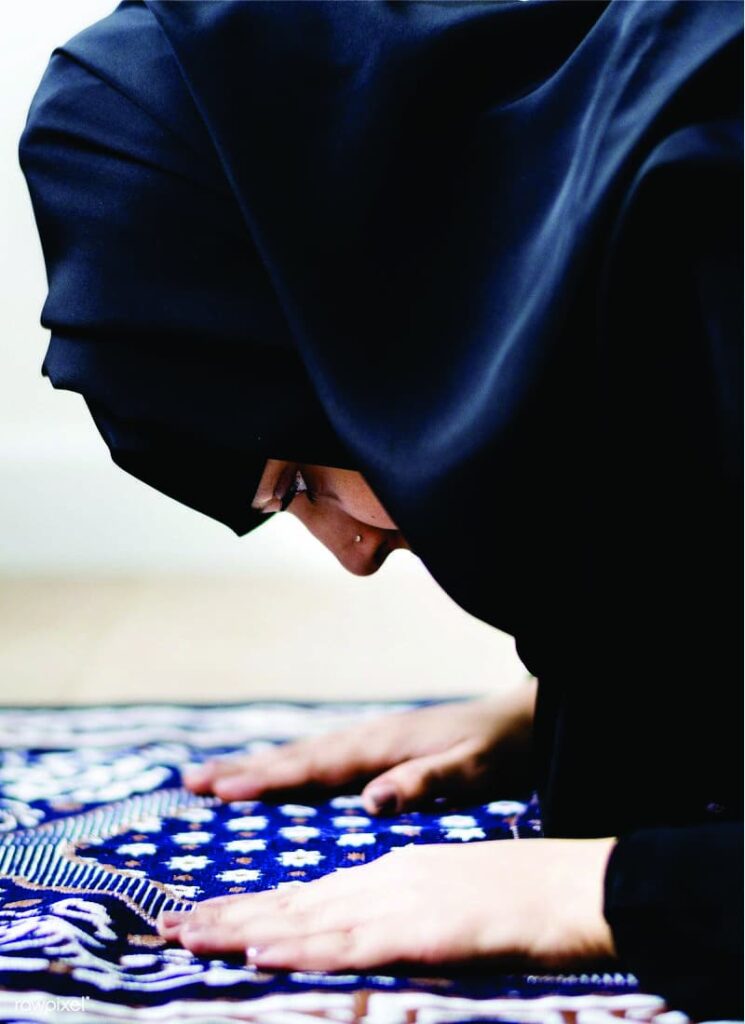Sajdaĥ Tilāwat- Write a Detail About Sajdah Tilawat in Quran?
- Sajdaĥ Tilāwat becomes Wājib when one recites or hears verse of Sajdaĥ [prostration]. (Al-Ĥidāyaĥ, vol. 1, pp. 78)
- Sajdah Tilawat- Recitation of the translation of a verse of Sajdaĥ in Persian or any other language also makes the Sajdaĥ Wājib on the reciter and the listener, whether the listener understands that this was a verse of Sajdaĥ or not. However it is necessary to inform him that it was the translation of a verse of Sajdaĥ if he is unaware of it. And if it was the recitation of a verse of Sajdaĥ, then it is not necessary to inform the listener that it was a verse of Sajdaĥ. (Fatāwā ‘Ālamgīrī, vol. 1, pp. 133)
- It is a condition for recitation that the volume of recitation should be at least such that it can be heard by the reciter himself if there is nothing preventing him from hearing (Baĥār-e-Sharī’at, vol. 1, part 4, pp. 728)
- Sajdah Tilawat-It is not necessary for the listener to have intentionally heard the verse; the Sajdaĥ becomes Wājib even on hearing the verse unintentionally. (Al-Ĥidāyaĥ, vol. 1, pp. 78)
- Sajdah Tilawat- If the verse was recited with such a volume that it can be heard, but because of noise or deafness he was unable to hear, the Sajdaĥ becomes Wājib on him. However, if his lips merely moved but sound was not produced, the Sajdaĥ will not be Wājib. (Fatāwā ‘Ālamgīrī, vol. 1, pp. 132)
- Sajdah Tilawat- It is not necessary to recite the entire verse for the Sajdaĥ to become Wājib. Merely reciting the word which contains the matter of the Sajdaĥ, along with a word present before or after it, is sufficient [for it to become Wājib]. (Rad-dul-Muḥtār, vol. 2, pp. 694)
- Sajdah Tilawat- When making an intention for the Sajdaĥ Tilāwat, it is not necessary to relate it to the specific verse; a general intention of performing Sajdaĥ Tilāwat is sufficient. (Durr-e-Mukhtār, Rad-dul-Muḥtār, vol. 2, pp. 699)
- Sajdah Tilawat- If a verse of Sajdaĥ is recited outside of Ṣalāĥ, it is not Wājib to perform the Sajdaĥ immediately. It is, however, preferred to perform it immediately. If one is in the state of Wuḍū, then delaying it is Makrūĥ Tanzīĥī. (Durr-e-Mukhtār, vol. 2, pp. 703)
- Sajdah Tilawat- If it is not possible to perform the Sajdaĥ at that time for any reason, it is Mustaḥab for the reciter and the listener to recite: We heard and we obeyed, may forgiveness be granted by You, O our Lord, and towards You we return. [Kanz-ul-Īmān (Translation of Quran)] (Part 3, Al-Baqaraĥ, verse 285) (Rad-dul-Muḥtār, vol. 2, pp. 703)
- Sajdah Tilawat- If, in the same Majlis ( For the definition of a Majlis and for more details regarding gatherings, refer to the publication of Maktaba-tul-Madīnaĥ: Baĥār-e-Sharī’at, volume 1, part 4, page 736. ) (gathering), one verse of Sajdaĥ is repeatedly recited or listened to, only one Sajdaĥ will be Wājib, even if it is heard from different people. Similarly, if one recited a verse (The Holy Quran ) [of Sajdaĥ], and then he heard the same verse from someone else, only one Sajdaĥ would be Wājib upon him. (Durr-e-Mukhtār, Rad-dul-Muḥtār, vol. 2, pp. 712)
- Sajdah Tilawat- It is Makrūĥ Taḥrīmī to leave the verse of Sajdaĥ out when reciting the whole Sūraĥ. There is no harm in reciting the verse of Sajdaĥ alone; however, it is better to recite a few preceding or succeeding verses with it. (Durr-e-Mukhtār, vol. 2, pp. 717)
![Write a detail about sajdah Tilawat in Quran? Listen lyrics, prostration meaning, prostration benefits, Fulfilment in sentence and quranmualim. Learn Quran, Quran translation, Quran mp3,quran explorer, Quran download, Quran translation in Urdu English to Arabic, almualim, quranmualim, Islam pictures, Islam symbol, Shia Islam, Sunni Islam, Islam facts],Islam beliefs and practices Islam religion history, Islam guide, prophet Muhammad quotes, prophet Muhammad biography, Prophet Muhammad family tree.](https://www.quranmualim.com/wp-content/uploads/2019/05/Write-a-detail-about-sajdah-Tilawat-in-QuranC.jpg)
For the fulfilment of needs:
- Sajdah Tilawat- According to the Ḥanafī doctrine there are 14 verses of Sajdaĥ in the Holy Quran, and if all 14 of these are recited in a Majlis for any particular purpose, and then the Sajdaĥs are performed, Allah will fulfil that purpose, whether the person does a Sajdaĥ after every verse or does all 14 Sajdaĥs collectively after reciting all 14 verses.
Write a Detail About Sajdah Tilawat in Quran?
| Sr No | Quran Surah Names | Surah Number | Verse No |
|---|---|---|---|
| 01 | Sipaarah (juzz) Al-A’raaf (The Heights) | 7 (Seven) | 206 |
| 02 | Sipaarah (juzz) Ar-Ra’d (The Thunder) | 13 (Thirteen) | 15 |
| 03 | Sipaarah (juzz) An-Nahl (The Bee) | 16 (Sixteen) | 50 |
| 04 | Sipaarah (juzz) Al-Israa (The Night Journey) | 17 (Seventeen) | 109 |
| 05 | Sipaarah (juzz) Maryam (Mary) | 19 (Nineteen) | 58 |
| 06 | Sipaarah (juzz) Al-Hajj (The Pilgrimage) | 22 (Twenty two) | 18 |
| 07 | Sipaarah (juzz) Al-Hajj (The Pilgrimage) | 22 (Twenty two) | 77 |
| 08 | Sipaarah (juzz) Al-Furqaan (The Criterion) | 25 (Twenty Five) | 60 |
| 09 | Sipaarah (juzz) An-Naml (The Ant) | 27 (Twenty Seven) | 26 |
| 10 | Sipaarah (juzz) As-Sajda (The Prostration) | 32 (Thirty Two) | 15 |
| 11 | Sipaarah (juzz) Saad (The letter Saad) | 38 (Thirty Eight) | 24 |
| 12 | Sipaarah (juzz) Fussilat (Explained in detail) | 41 (Forty One) | 38 |
| 13 | Sipaarah (juzz) An-Najm (The Star) | 53 (Fifty Three) | 62 |
| 14 | Sipaarah (juzz) Al-Inshiqaaq (The Splitting Open) | 84 (Eighty Four) | 21 |
| 15 | Sipaarah (juzz) Al-Alaq (The Clot) | 96 (Ninty Six) | 19 |
Dua of Sajdah e Tilawat
When we are performing Sajdah Tilawat in the recitation of the Holy Quran make this dua Prayer : Dua of Sajdah e Tilawat
- Sajada wajheha lil ladhi khalaqa hu,
- wa shaQa sam ahu,
- wa basara hu,
- be howlee hee wa quwatehee
- fatabarakallahu ahsanal Khaliqeen “
Dear Brothers and Sisters , Other options of what to say in Sajdah Tilawat: If one has not memorized the above dua then “Subhan Rabbi al Ala’a” can be repeated 3 Time in Sajdah Tilawat . واللہ تعالی اعلم
Conditions (Sajdah Tilawat)
The same conditions regarding Tahaarat, Wudhu apply Must . Note: Sajda-e-Tilawat (prostrate ) or other sajdahe Namaz (Salat ) performed during Salah, recitation of the Holy Quran, is not allowed during sunrise, noon, and sunset.
What is the right way to preform sajdah tilawat (prostrate )? What is recited and when is it done? Explain- JazakAllah Khair. How to Perform Sajda-e-Tilawat (prostrate)
- Stand facing the Qiblah
- Make intention for Sajda-e-Tilawat (prostrate)
- No raise your hands, go into Sajdah saying Allahu-Akbar
- Read: Dua – Subhaana Rabbiyal A’ala Only 3 times
- Rise with Allahu-Akbar and Stand Up
- Go straight back into Sajdah and continue until 14 sajdahs are complete, then after the last sajdah (prostrate), do salam as you would for Salaah (Right and Left Shoulder).
You may also peform Sajdah-e-Tilawat (prostrate ) sat down if necessary, however standing is most preferred.









